Want to live in Dubai? Are you looking for information on how to come and settle in the city?
I explain everything you need to know in this article 🙂
Dubai is a great destination to live a good life. More than 40,000 Americans have already understood this and are already living there! They chose the emirate not only for its postcard decor but especially for its comfort, its extremely low crime rate and the high possibility to find their dream job there.
If you too are tempted by the experience of expatriation in the so-called "Manhattan of the Desert", which seemed inaccessible not so long ago, read the article below!
You will find the answers to all the questions you may have about the city of luxury and excess.
I give you the steps to follow before leaving as well as the formalities to complete. I also give you a lot of information, advice and tips about work, school and the health system in Dubai
In short, you'll be well prepared before embarking on this extraordinary adventure! 😊LIVING IN DUBAI: ADMINISTRATIVE FORMALITIES
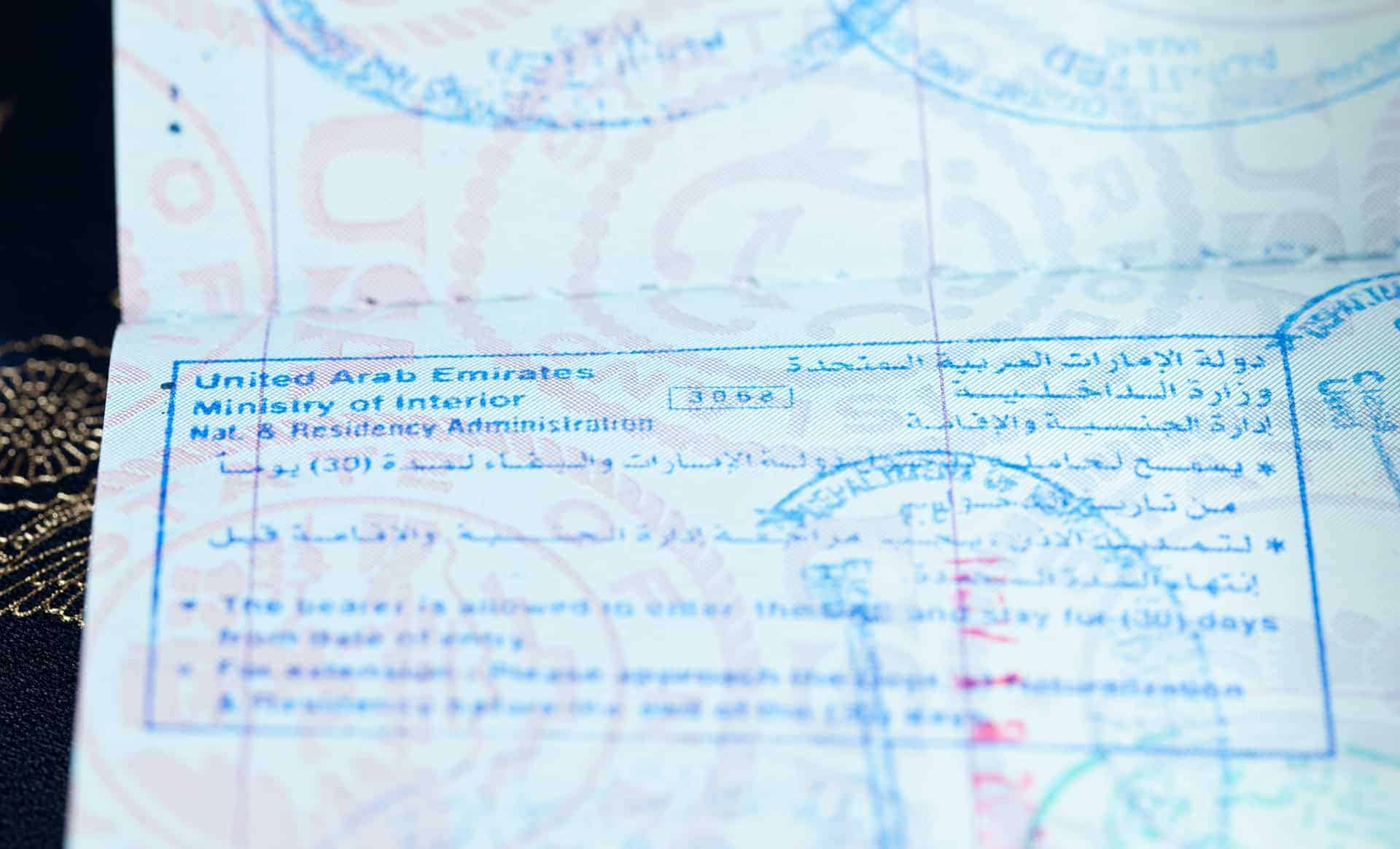
To visit the "Manhattan of the Desert", you only need a tourist visa for Dubai.
It is issued on arrival and is valid for 30 days. There is no particular procedure to follow if you have american passport. To settle in Dubai and live in the emirate, however, you will need a residency visa.
Please note that the formalities for issuing a residency visa are constantly changing (as are the fees!). To make sure you have the right information, check with the Dubai Embassy or Consulate.
DUBAI EMBASSY IN USA |
|---|
3522 International Court, NW Suite 400 Washington, DC 20008 |
Phone : (202) 243-2400 |
Website : https://www.uae-embassy.org/ E-mail : consular.LA@mofaic.gov.ae |
For your information, here is what you need to know: ANY AMERICAN PERSON WISHING TO MOVE TO DUBAI (IN THE UNITED ARAB EMIRATES) NEEDS A RESIDENCY VISA AND A WORK PERMIT.
You must therefore first have found a job in Dubai. In addition, you must be sponsored by an employer: he will be your "sponsor". He will take care of the procedures concerning your residence and work visa (he can also take care of your family's visas).
You can obtain this visa :
- Through a company:
You manage or have a company in free-zone, you are a shareholder, employee or family member of an employee of this company
- Following the acquisition of a property :
You have purchased a property in Dubai.
Here are the documents to be provided for your application:
- a copy of your diplomas
- your marriage certificate
- your birth certificate
- a copy of your employment contract
- a copy of your family record book.
Depending on the case, you will also need to provide proof that you have an office in Dubai, and the RIB of an account with at least AED 75,000 (approximately 20,420$)
Please note that these documents must be translated and certified by the Ministry of Foreign Affairs and the UAE Embassy in Washington.D.C
If you wish to settle in Dubai to enjoy your retirement, there exists a special system: it is a long term visa for people over 55 years old. There are a few requirements: you must have a monthly income of more than AED 20,000 (about $5,400), available savings of AED 1 million (about $272,257) or own a property in Dubai worth two million dirhams (about $544,514).
Before you can get a residency card, you will have to undergo a medical examination (including a check for HIV, TB and STDs) and be fingerprinted. This medical test will enable you to obtain your Emirates identity card.
Note that:
- The residency visa is valid for 3 years. It is renewable for 3 years (with a new procedure).
- It gives you the right to live and work in the seven UAE emirates.
- You must carry it with you at all times.
- To keep your residency card, you will have to go back to the immigration services at least once every 6 months (if you spend more than 6 months outside Dubai, your residency card will be cancelled).
- There is an age limit of 50 years to apply (unless there is a valid reason).
Once in Dubai, you must register with the Consulate. This will allow the Consulate and the American Embassy to provide you with a lot of information and to alert your relatives in case of emergency. This registration will also allow you to simplify certain formalities (request for administrative documents, registration on the consular electoral roll, etc.).
COVID period :
You can still travel to Dubai, but you will have to declare that you are not infected with the virus to the health authorities upon arrival. You will also need to complete a quarantine form. Finally, you will need to download and register for the Covid-19 DXB App.
LIVING IN DUBAI: WHAT ABOUT WORK?

Dubai offers many job opportunities, as well as a high standard of living. And as long as you speak English, your integration will be easy!
Sectors that are recruiting include IT, hospitality, teaching, medicine and catering.... But you'll have no trouble setting up your own company (opening a shop, a restaurant, etc.), developing it and seeing it prosper. Not to mention that the emirate is a real tax haven... Which is an important point to bear in mind if you want to live in Dubai!
The work permit is granted by the Ministry of Human Resources and Emiratisation. But I would like to remind you that before you can apply for it, you need a sponsor (individual or company). This sponsor will take care of your administrative formalities and never forget that this person or company will be responsible for your violations!
There is no minimum wage in Dubai but salaries are more attractive than in the US(around 2,600 net/month). It is the employer who sets the basic salary, to which he can add several benefits: airfare to Dubai, accommodation, health care, schooling, transport, telephone, etc. Therefore, do not hesitate to negotiate before signing your employment contract!
There is no income tax either, but you will find that there are many taxes including a 5% VAT on goods and services.
What are the disadvantages? The working day is longer than in the USA. The legal working hours are 48 hours per week and overtime is often necessary. Finally, you are only entitled to 30 days of holiday per year (not really enough given the work involved and the time required to visit your family in the US!)
Note that Sunday is the first day of the week, while Friday (day of prayer) and Saturday are the weekend.
LIVING IN DUBAI: FINDING ACCOMMODATION
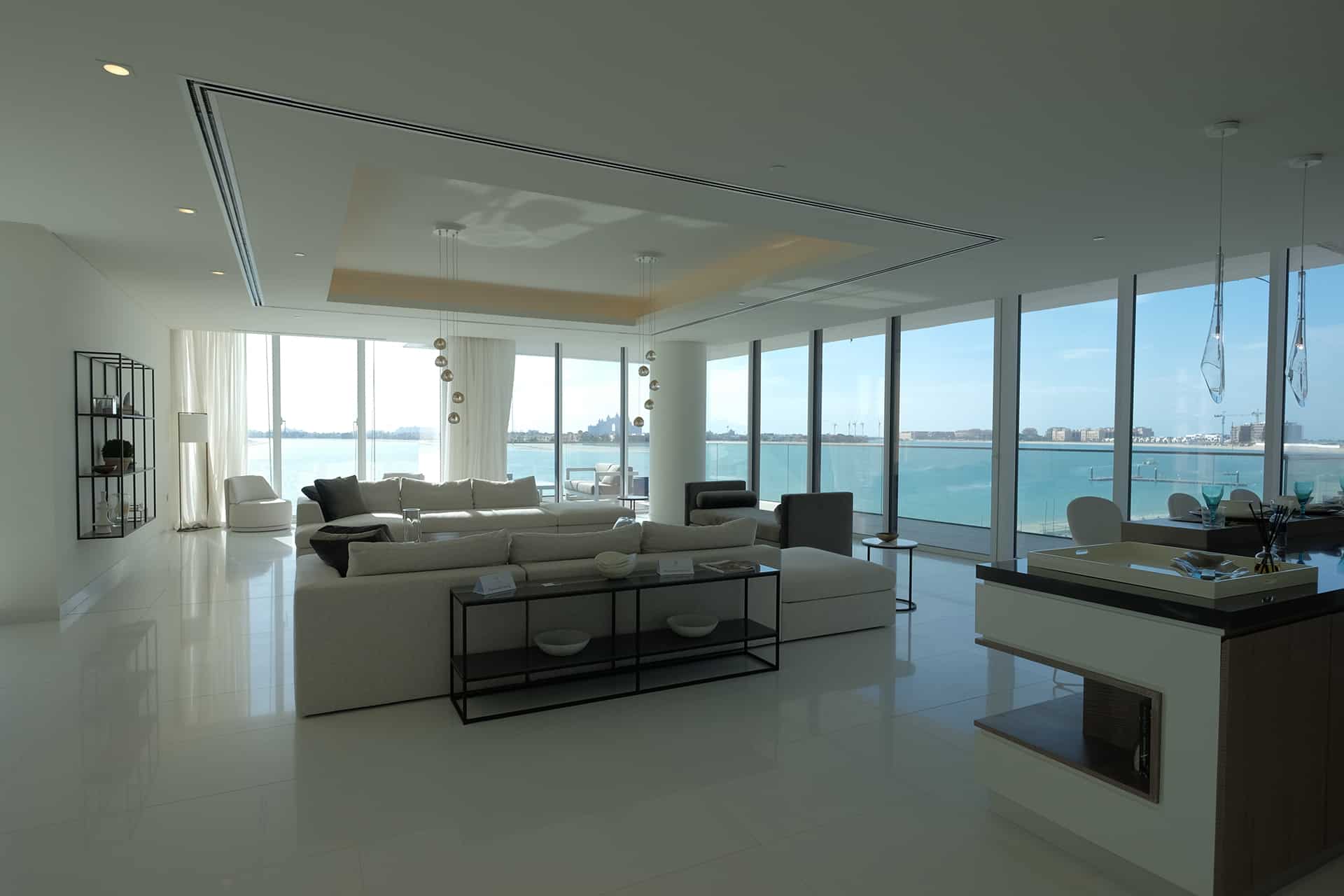
As far as accommodation is concerned, you will be spoilt for choice in Dubai. There is more supply than demand, so you are bound to find accommodation that suits your budget and needs.
When you first arrive, look for a hotel for a few days or even weeks while you find the right flat. If you don't know where to sleep in Dubai, I have a full article on the subject 🙂
You can opt for a villa or a flat, or choose to live in a furnished or unfurnished house. You can live in beachfront accommodation (there are some great beaches in Dubai by the way!), right in the city center or even right on the edge of Dubai's desert gates.
There is also the possibility of living in compounds. These are a kind of housing estate where all the houses are identical. This allows you to live in a community and enjoy gardens and a communal pool.
When choosing a compound, be sure to take into account the distance to your workplace, your children's school and the various shops.
The best areas to live in Dubai (and those preferred by expats) are Dubai Marina (ideal for young professionals looking for a trendy area), Downtown Dubai (the city center is perfect for expats with high incomes, especially young executives), Jumeirah Beach Residence or Arabian Ranches (perfect for expat families looking for green spaces and calm).
But note that these are the most beautiful areas of the city, and therefore the most expensive. You will find high standard accommodation with outstanding facilities (gym, swimming pool...).
For better prices, opt for the older parts of Dubai, such as Deira or Bur Dubaï.
You can buy or rent : it all depends on how long you want to live in Dubai.
If you are planning to live here for several years, buying is preferable, but beware: in some areas, foreigners are not allowed to buy. In addition, you must have lived in Dubai for at least 6 months to purchase a property. In any case, get a real estate agent to accompany you. He or she will be able to offer you properties that meet your expectations.
If you choose to rent, the rental will be for a period of one year, renewable. You will need to provide a copy of your residence visa, your passport and a letter from your employer stating your income. And above all, you will have to pay in advance! Yes, rent is paid by the year. However, some landlords accept payments by cheque in 3 or 4 installments.
Also note that the rent does not include utilities. You will have to pay your water and electricity bills separately every month (to the DEWA company). The price varies according to your consumption and will include your council tax (5% of the annual rent)
Though it exists in practice, sharing a flat is not allowed (it is even illegal), especially between people of the opposite sex (unless they are married of course!).To help you prepare a budget, here is a small idea of the current rental/purchase rates in Dubai:
Neighborhood |
| BUY | |
|---|---|---|---|
Dubai Marina | 1-bedroom flat:
Between 65 000 and 110 000 AED/year (17,700 and 30,000 $) | 5-bedroom flat:
approximately 2,801,945$ | |
Downtown | 1-bedroom flat:
Between AED 80,000 and 120,000/year ($21,800 and $32,700 | 4-bedroom flat:
Approximately 3,290,602$ | |
Arabian Ranches | Villa : Between AED 115,000 and 220,000/year ($31,300 and $60,000) | House with 3 bedrooms and 3 bathrooms:
Approximately $255,300 |
I almost forgot: there are no post boxes in Dubai! To receive your mail, you will need to opt for a post office box or arrange for your mail to be delivered to your workplace. To do this, visit the Emirates Post website!
HOW TO GET AROUND DUBAI?
Dubai is a very large city. It is almost 70 km long from north to south
PUBLIC TRANSPORT
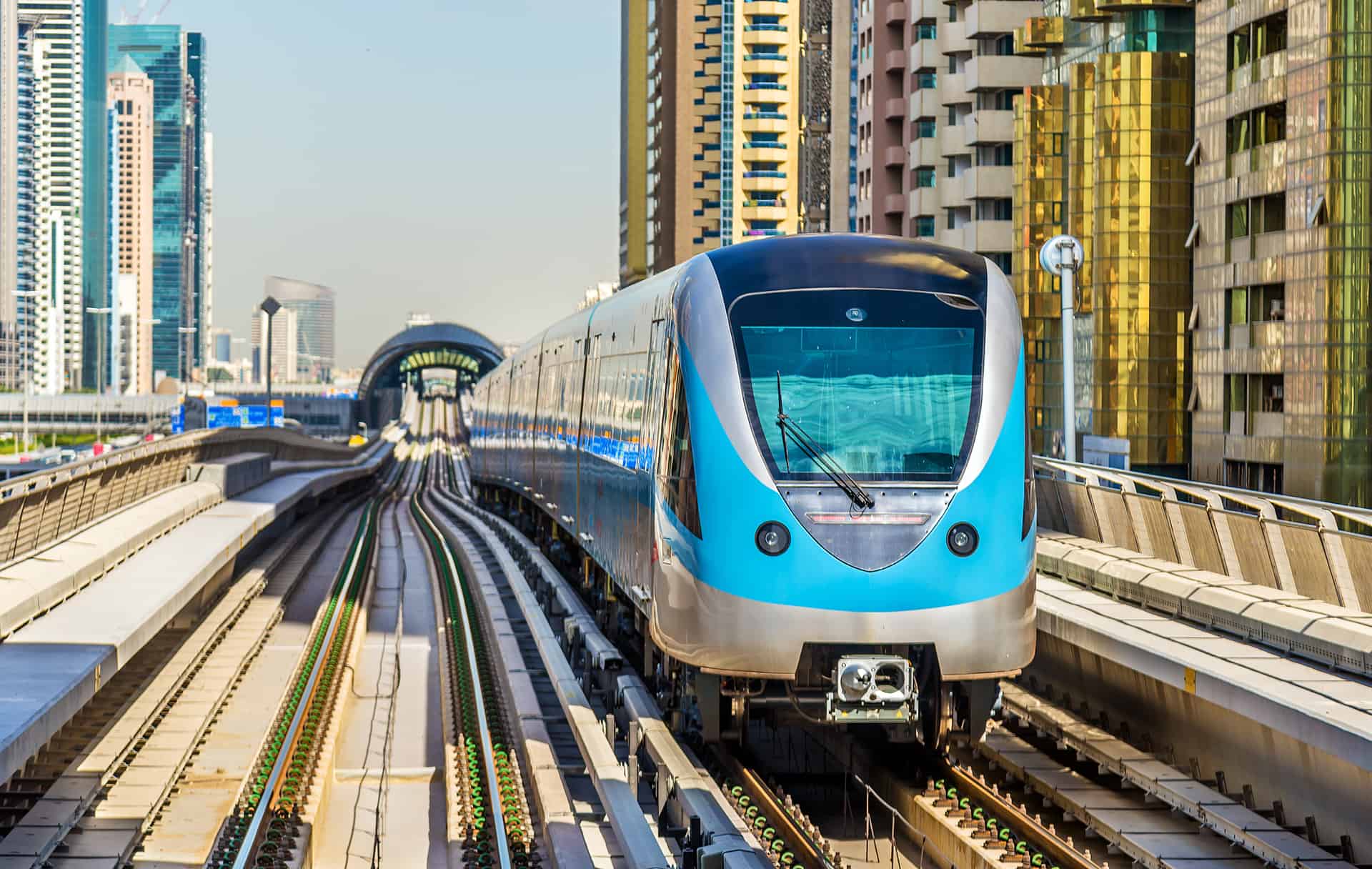
The most practical and economical way to get around is to use the Dubai Metro. It is fully automated and quite well developed despite only having 2 metro lines (the red line and the green line). To use it, you will need a NOL CARD, which can be used for all public transport.
You can buy a single ticket or passes (daily, weekly, monthly or yearly).
Here are the fares you can find on the official transport website (RTA)
| Price per unit | Refill limit | Validity | |
|---|---|---|---|---|
Personal card | 70 AED | AED 5,000
Benefits: Recover your balance if your card is lost or stolen + Secure online services for additional credit | 5 years | |
Silver Card The basic NOL card | 25 AED ($6.8) | from AED 1,000 to AED 5,000 | 5 years | |
Gold Card | 25 AED ($6.8) |
| 5 years | |
Disposable red ticket (one mode of transport at a time | 2 AED | Refillable use for up to 10 trips or 5 daily passes | 90 days |
Access to the subway is free for children under 5 years old or less than 90 cm tall.
Please note that there are 3 types of carriages: "regular", "gold class" (with leather seats and more places) and the ones reserved for women and children. And it is forbidden to eat or drink in any of them!
If you want to live in Dubai, the metro is definitely the best choice for public transport.
You can also take the bus. There are many routes and they run from 6am until midnight.
The tramway covers only 11 stations (one line). The "Palm Jumeirah Monorail" is a track that connects the artificial peninsula to the mainland.
Finally, there are water buses and water taxis, which allow you to cross the Dubai Creek.
DRIVING IN DUBAI
Having a car in Dubai is more than advantageous, especially since the road network is of excellent quality!
You can buy a car (they cost less than in the USA!) or choose to rent a car in Dubai.
You should expect to pay at least AED 1,300/month for a small car, which is less than 350 US dollars/month.
In any case, choose a 4x4 over a city car; you'll find it much more practical, especially if you're planning to go into the desert. You'll be safer in case of accidents too!
Yes, driving in Dubai is a bit complicated : there are many junctions and exits and drivers are not very talkative. As a result, the number of accidents is quite high.
So be sure to get insurance!
Note that you will need to buy (at a petrol station, Customer Service Center or on the city's transport website (RTA)) an electronic sticker that will record each time you pass through a toll zone - each pass costs 4 AED, Dubai's crrencyor 1 US dollars (there are 7 "SALIK" tolls/points in Dubai).An additional advantage is that fuel costs less than in the USA (about 0.55 US dollars/liter).
On the other hand, be very careful: there is zero tolerance for drinking and driving. If you are caught drunk driving, you can go to jail and, in case of an accident, your insurance will simply not be valid
To drive in Dubai, in addition to your American driver license, you will need to apply for an international license. It will be valid for 2 years.
TAXI
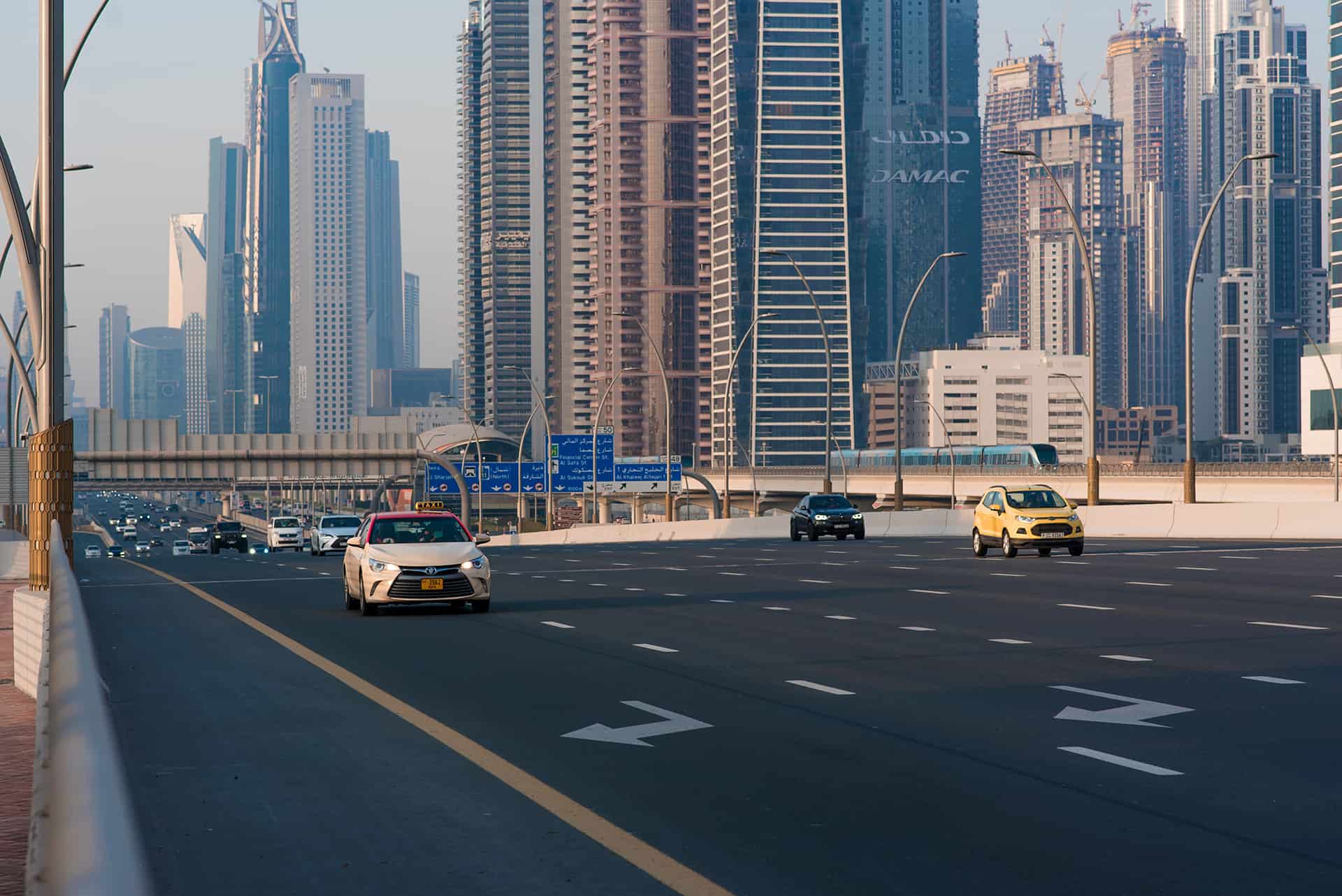
There is another alternative: the taxi (they are beige with a coloured roof). There are even pink taxis reserved for women, and all of them offer very attractive fares day and night (12 AED/journey minimum, i.e. 3.27 US dollars). To estimate the price of a taxi ride in Dubai, you can look at this website.
Alternatively, you can book a VTC through the Uber and Careem apps.
LIVING IN DUBAI WITH CHILDREN: EDUCATION
Dubai has a high standard of international education. And everything is done to ensure that the children’s integration goes as smoothly as possible. Moreover, you can choose between the English or international education system for your children.
If you want to live in Dubai with children this is a very important point!
Prices vary according to the schools but the English public schools are more or less affordable. Don't hesitate to negotiate the payment of your children's school fees when you sign your employment contract, it is quite possible that your employer will agree to pay them
There are a lot of international schools in Dubai, where english is the main teaching language, all of which are recognized and considered by expats:
- the GEMS Wellington International School in Al Sufouh.
annual fees from AED 43, 941 to AED 95,597 (see more details here)
- Kings' School Dubai in Umm Suqeim 3- kindergarten to primary school
From AED 43,619 to AED 66,383/year (see more details here)
Jumeirah English Speaking School in Al Safa 1 - primary school to highschool.
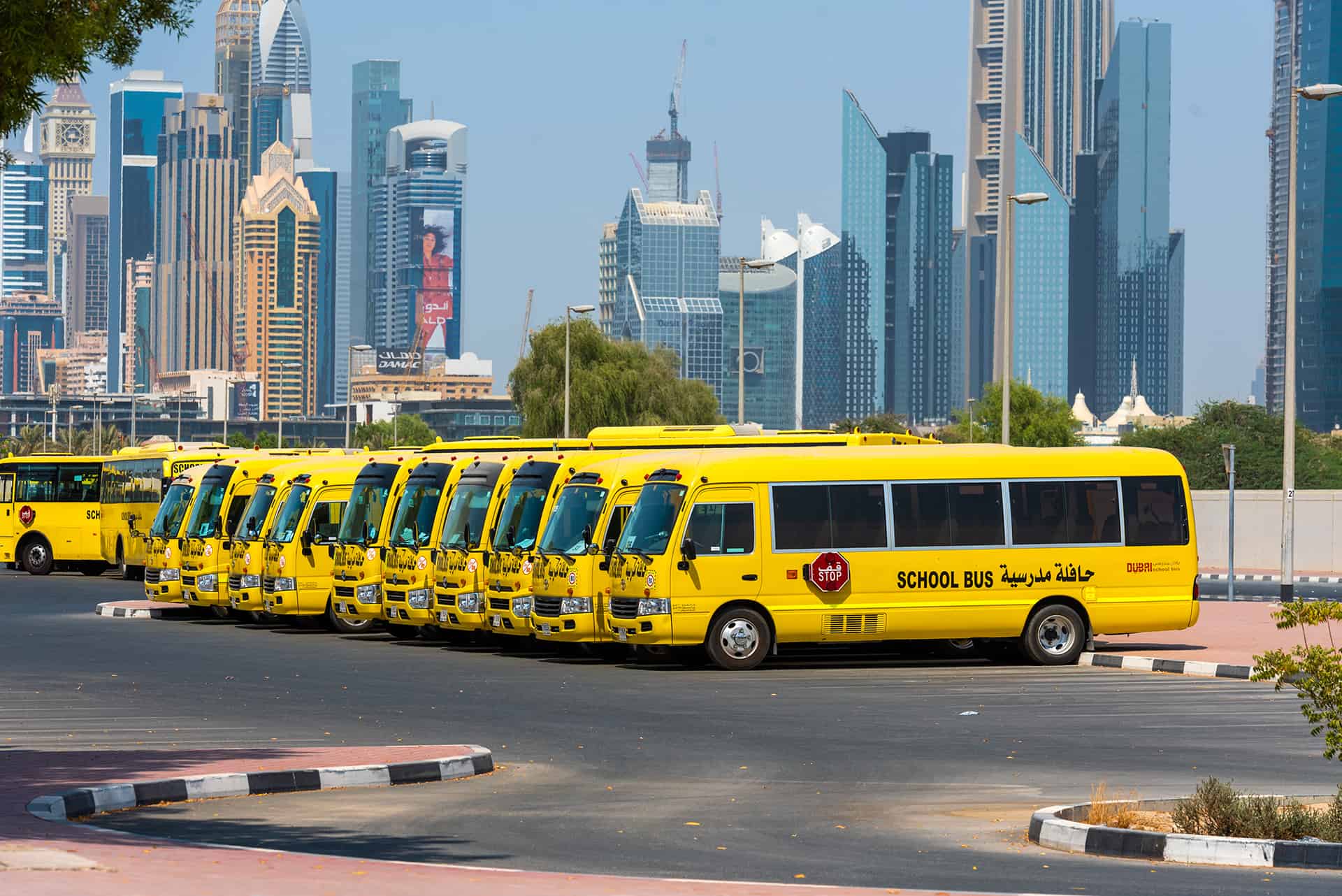
Please note that waiting lists for schools can be long, so be sure to check in advance (there may be entrance tests, for example). Registration takes place in October/November and there are registration, application and insurance fees to consider.
For English-speaking day nurseries, expect to pay on average AED 30,000/year (over $8,170) for a half day and AED 40,000/year for a full day (over $10,9000).
Note that:
- Days start at 8am and end at 3pm.
- There are quite a few extra-curricular activities in the afternoon, so budget for that! As well as for school transport if you don't pick up your children at the end of the day. An activity costs between 600 and 1,400 AED or between 152 and 355 $/term.
- Please note that some schools do not have a canteen at lunchtime, so remember to pack a lunch box.
- Arabic classes are compulsory from the age of 4.
- Children/students who do not have a sufficient level of English can benefit from language support: EAL (English as Additional Language). If you have any problems, please do not hesitate to seek after-school tutoring.
- Dubai International Academic City is home to a number of major universities and colleges.
To help you at home, you can hire a home help, a maid. She can live with you in a room attached to your house (live-in maid) and you will pay her between AED 3,000 and 4,000/month (between $677 and $1,020). She can also come only during the day (live-out maid). In this case, you should expect to pay around AED 30-40 per hour (between $34 and $45).
MOVING TO DUBAI: HEALTH CARE COSTS
If you want to live in Dubai, you should know that the emirate has the best hospitals in the UAE and the best doctors. It has public and private hospitals as well as military facilities.
The “Dubai Health Authority" runs the health system in Dubai. It is compulsory to apply for a health card upon arrival in the emirate. To obtain it, you will need to provide a copy of your passport, your employment contract and your Emirates identity card (it costs AED 300, or about $82).
You will also need to take out health insurance to cover your consultations and the payment of your prescription drugs (be warned: reimbursements are long). This is usually included in the package offered by the company that employs you.
If you can, take out an international health insurance policy, which will give you better protection.
As an indication, a consultation with a general practitioner costs between $52 and $125, and with a specialist between $107 and $268. If you wish to see a English-speaking doctor at home, you will be charged a minimum of €170.
Also note that :
- Doctors speak both Arabic and English, though many also speak French.
- Emergency care is fast.
- Most medicines are available over the counter. Some medicines are prohibited, especially those containing morphine.
- Pharmacies are open from 9.30am to 1pm and from 4.30pm to 8.30pm. Outside these hours, you should go to the pharmacy on duty or the hospital pharmacy.
INTERNET AT HOME AND ON THE PHONE
Three telephone operators share the telecommunications market in Dubai: "DU", "Etisalat" and "Virgin Mobile". They all offer attractive phone contracts.
Wifi is available everywhere (cafes, shopping malls...) but know that some websites are forbidden (political, pornographic...).
If you want to call your family, don't forget that there is a 9-hour time difference with the USA.
LIVING IN DUBAI, WHAT LEISURE ACTIVITIES?
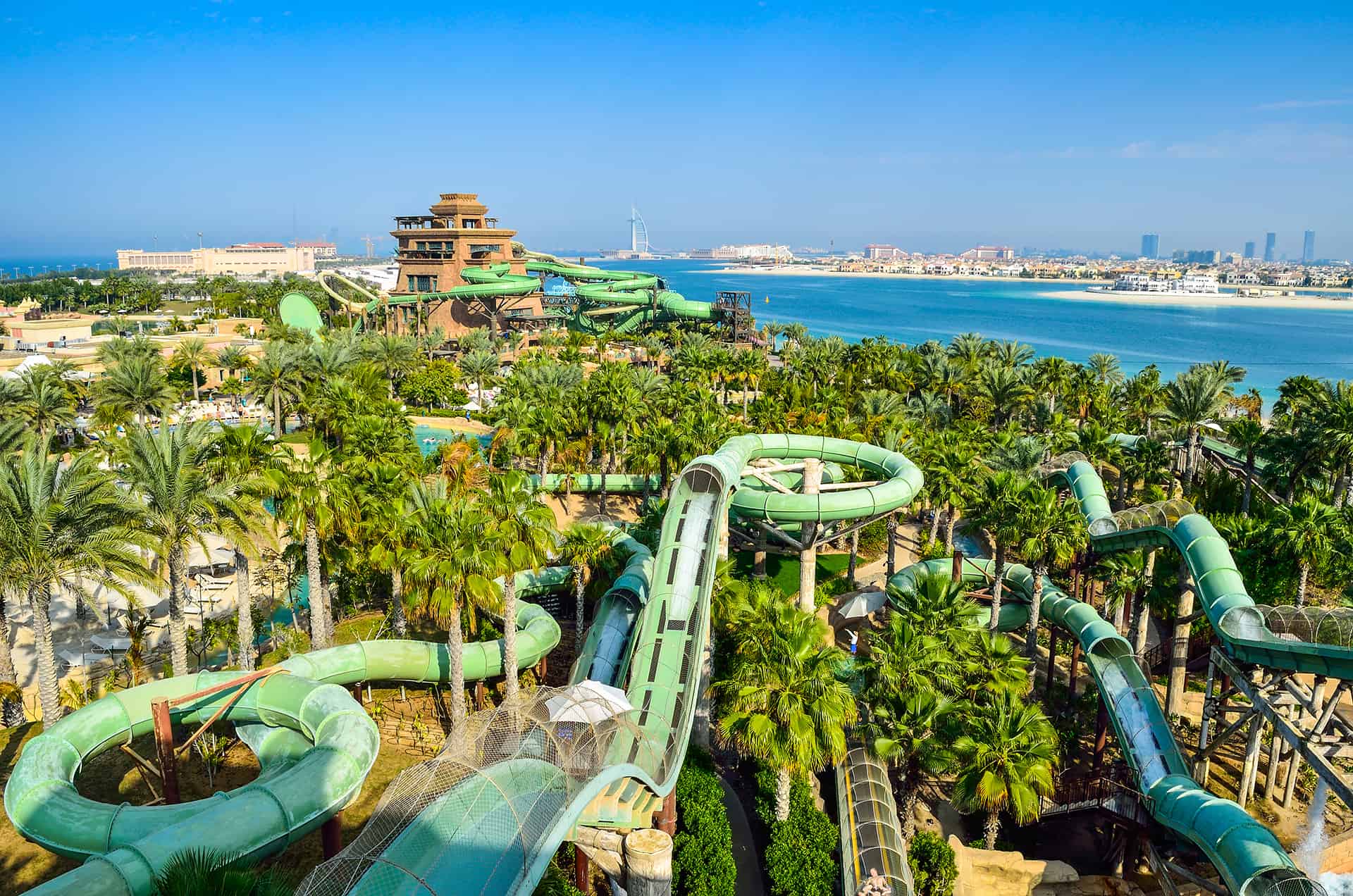
Dubai is truly an exceptional destination! Situated between the sea and the desert, it offers endless possibilities of escape. The downside is that the cost of activities and outings is higher than in the USA! However, you really can do anything you can dream of.
The emirate is at the crossroads of many civilisations and cultures and has many museums and art galleries. You can also go to the opera and cinema: most are in the malls, but there are also open-air cinemas.
Dubai is also about luxury and excess, with designer shops gigantic shopping malls and skyscrapers offering breathtaking views, such as the famous Burj Khalifa.
You can even ski in Dubai, even though it can be over 45°C outside!
Of course, you can simply choose to laze on the white sandy beaches sunbathe and swim in the calm blue waters of the Arabian Gulf, or try your hand at a variety of water sports, swimming with dolphins or sliding through a tunnel with sharks!
There are also some amazing water parks in Dubai ! You really won't have time to get bored on weekends 🙂
And of course, don't forget the desert rides on quad bikes, 4x4, camels or even hot air balloons!
And although an Islamic state, Dubai is also known for its nightlife. It is also famous for its many trendy bars and Beach Clubs where you can party and dance to the sounds of world famous DJs.
Please note that bars and restaurants must have a license to sell alcohol. And if you want to buy some (in specialized shops), you will have to apply for a buying license to the police departments (the license has to be renewed every year).
MORE INFORMATION ABOUT LIVING IN DUBAI!
- The main religion in Dubai is Islam (you will hear the call to prayer 5 times a day). But the emirate is open to other cultures. Women are freer than in other Middle Eastern countries: they drive, work, do what they want, wear the veil or not...
- Expatriates enjoy relative freedom, but always be open-minded and respect local customs! Do not be disrespectful, especially during the holy month of Ramadan (for example, do not eat outside). Don't wear indecent clothes either (monokinis are forbidden, avoid deep necklines or short dresses)...
- There are many foreigners in Dubai: westerners as well as easterners (Indians, Filipinos, Lebanese...) including a large community of English speakers. You can contact expatriate associations such as InterNations (a community for american expats in Dubai) You will find support and help in case of need, and get good tips, advice and you will make friends too!
- You can get married in Dubai if at least one of either the bride and groom has been a resident of the UAE for at least one month.
- You can bring your pet with you. You will need an Import Permit - after that, it will simply need to be microchipped, have its vaccinations up to date, and have an international certificate of good health. You will need to register it with the city.
Arabic is the official language.
The currency is Emirati Dirham (AED) 1 AED = 0,27 DOLLARS
ADVANTAGES OF LIVING IN DUBAI
- Good weather all year round: the sun is always shining, with a rather pleasant period between October and April (25-30°C during the day and mild nights with 18°C on average). Remember to check when to go to Dubai to avoid arriving in the middle of summer, smack-dab in the high temperatures...
- Dubai is a shopper's paradise: you'll find everything from luxury brands to basics. Of course you can buyAmerican products (you will find pork in special departments (pork rooms - where Muslims cannot enter). The shops are open every day of the week and sometimes 24 hours a day. Home delivery is of course possible
- I have already mentioned this, but the income is tax free, and the education is good..
- No need for special equipment for your electrical appliances (220w).
THE DISADVANTAGES OF LIVING IN DUBAI
- The heat! Especially from June to September, the heat is almost unbearable: up to more than 45°C and the humidity is very high (it often reaches 95%). However, there is no need to worry, as all infrastructures are air-conditioned, including transport.
- Rain is rare, but when it does rain the streets are quickly clogged (there’s no drainage system.) Similarly, sandstorms can sweep through the city from time to time.
- Intense work: often the working hours exceed 35 hours (more than 8 hours a day and 6 days a week).
- Heavy road traffic (lots of traffic jams), especially in the morning and evening when employees return home to remote areas.
- Construction sites all over the city.
- The cost of education.
- The cost of housing.
And that's it for this article on living in Dubai! I hope you found it useful! If you have any questions, feel free to leave a little comment 🙂
I hope you enjoy your move to Dubai!


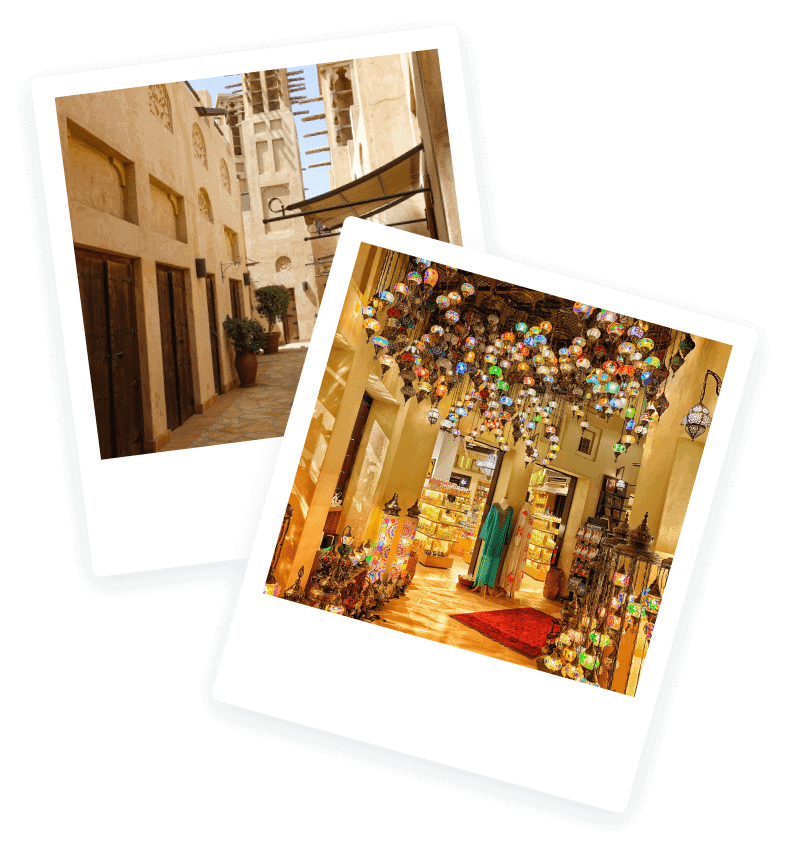
0 Comments